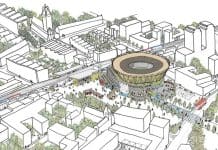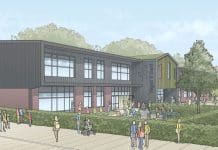The organisers of Birmingham 2022 Commonwealth Games have ditched plans to build a £500m athletes’ village and will instead split the competitors across three separate sites
The organisers of Birmingham 2022 have announced athletes and officials will be housed in three ‘campus’ villages at The University of Birmingham, The University of Warwick and The NEC Hotel Campus.
This new campus model will see 1,600 athletes and officials housed at the NEC Hotel Campus, 1,900 at The University of Warwick, and the principal village with 2,800 at The University of Birmingham.
The athletes’ village in the Perry Barr area was projected to cost £500m.
The decision to move away from the single site athletes’ village in the Perry Barr area of the city has been made by the Games Partnership with just under two years to go, after reviewing the impact of Covid-19.
The new three-site campus model for Birmingham 2022 athlete accommodation will be delivered within the overall Games budget of £778m.
It follows an assessment by the project delivery team, who has been working with the construction supply chain, as well as independent experts, on how they could de-risk Games delivery.
With a shorter than normal timeframe for delivery of the Birmingham 2022 Games, the new build accommodation site had very little scope to withstand the impact of Covid-19.
The Perry Barr Regeneration Scheme will still be delivered. This council-led residential scheme has been accelerated due to the Birmingham 2022 Commonwealth Games and has been made possible with additional investment from central government.
Moving away from the historic norm
Ian Reid, CEO of Birmingham 2022, said: “These are challenging times for all of us and delivering a major multi sports event during this period has meant we have needed to collaborate effectively, be pragmatic to change, and remain realistic about the challenges we face.
“We recognise that this new model is a move away from the historic norm and we are grateful for the support shown by our partners across the Commonwealth Games Associations.
“Birmingham and the West Midlands is extremely fortunate to have superb alternate facilities and we are making this decision now, with two years to go, to de-risk the project, ensure delivery for athletes and teams and secure the legacy of new housing and transport infrastructure in Perry Barr.
“This is the sensible and pragmatic thing to do for the Games, the athletes and for the people of Birmingham. It enables Birmingham City Council to focus on the delivery of the Perry Barr Regeneration Scheme and gives us enough time to plan essential Games services like transport and security.
“Furthermore, it offers athletes and teams the assurance of a warm welcome and a superb Games experience in their homes-from-home across the West Midlands.”
Councillor Ian Ward, leader of Birmingham City Council, added: “The key physical legacy from Birmingham 2022 is a regenerated Perry Barr – and by working closely with our Games Partners that is absolutely secure going forward.
“Work to deliver housing which is currently ongoing will continue in the months and years to come as part of the wider plan to deliver 5,000 much-needed homes for people in this area of the city.
“The fact we are moving straight to legacy on the residential scheme gives the council and its partners a chance to review the longer-term plans for homes in Perry Barr, to ensure they best meet the needs of local people.
“We will engage with local communities and offer more precise details on project timescales in due course.
“Put simply, this decision on the future of residential scheme brings greater certainty for the Commonwealth Games and will help us define a vision for Perry Barr which has the wellbeing of the community at its heart, to deliver the best possible legacy from the Games.”














